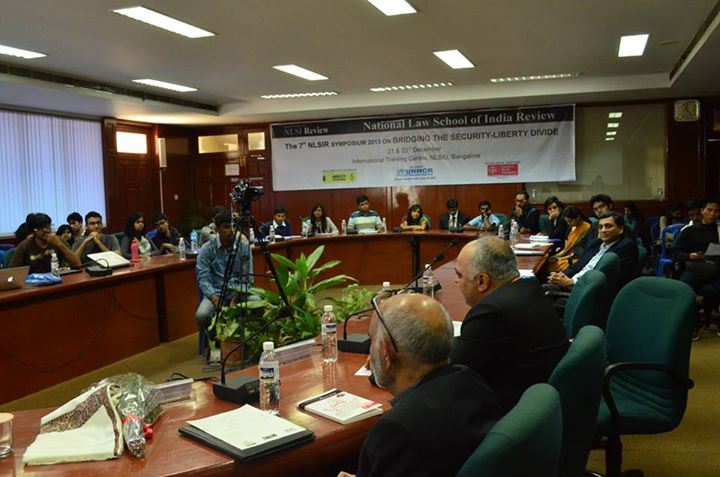Written by Radhika Goyal (Batch of 2019) and Aditya Patel (Batch of 2016)
One of the strangest things about stock markets is that a rumor about the price of shares often sets in motion a set of actions which ensure that the rumor comes true. A similar thing is happening in Law School where the constant presence of the “falling standards” discourse breeds perceptions and attitudes among the student body, which will inevitably result in actual falling standards. This article explores how this perception creates an environment that ensures that the falling standards doctrine will become a self fulfilling prophecy. It does not comment on whether Law School is experiencing falling standards but only argues that as long as the student body blindly perceives it to be true, the day is not far when it becomes true.
We are introduced to this idea in our first week of college by both faculty and seniors, who constantly barrage us with stories of the glorious past of Law School, all the while alluding that we are no longer what we used to be. They view the past with nostalgia-goggles that inevitably make the present look pale in comparison. The idea that we can never match the standards of those in the past haunts us throughout Law School and while it sometimes encourages us to work hard, this widespread perpetuation and subsequent acceptance of this idea has a pernicious effect on the attitudes of Law Schoolites. First, any achievement by Law School or Law Schoolites (Students and Faculty) is not given the credit it deserves. For instance, when our Legal Services Clinic won the prestigious MacJannet Prize, which is a testament of the exceptional impact it has had on the local community, the most prominent discussion on LSC at the beginning of the year was still about how it gets the most junior co-opt applications every year.
Another example is the Space Law Conference organised by Prof. Kumar Abhijeet (a Law Schoolite) that took place on campus earlier this trimester. It was attended by luminaries of the space industry and culminated in the pivotal Bangalore Declaration, the basis for the first Indian national space law. It was a significant moment in Indian space history where Law School played the central role and was featured on the front page of Economic Times and Scroll. The only place where it found no mention: Law School.
These illustrations showcase the blatant disregard among Law Schoolites towards the activities and achievements of its students who have worked hard to give back to the community and garner international recognition for NLS (‘raising standards’ if you will). Had these events or achievements taken place in our beloved NLUD or NALSAR, they would have been hailed as milestones heralding their unstoppable path to fame and greatness. However to our esteemed student body, professors and distinguished alumni, this is not registered as progress or achievement that takes Law School forward and is considered to be of no consequence. Instead, all we do is collectively cry about how LeGala hasn’t happened for many years.
On the flip-side, if anything goes wrong in college, it is met with excessive negativity and the standard line about falling standards. People fail to constructively engage with any problem or offer any solutions. When any alternate explanations to a perceived failure are proffered, it is blatantly ignored and dismissed as part of the uncontrollable falling standards of the institution. For instance, when a few of the current first years sent out mass emails for projects two days before Last Last Day everyone was quick to squawk about falling standards (“degeneration of academic standards”). However, no substantial effort was made to understand why this happened and how it could be solved.
Or, for instance, many seniors view the decline of the posts on 19(1)(a), or the erosion of Quad culture as a symbol of irreversible institutional decay, the irrational cloud through which this is seen precludes any scope for any explanation for the same. Thus, the decline of discourse on 19(1)(a) is construed as being a drop in the standard of critical thought in the student body, instead of acknowledging the rise of other forums, like Email and Facebook, where similar discussions now take place.
This brings us to the focal point of this article. Achievements of Law School get repeatedly ignored while the problems and shortcomings are harped upon ad nauseum, creating a scenario where we tend to live in past glory and forget that we still owe it to ourselves and the college to continue the legacy and not abandon it as rats would a sinking ship.
This environment has deleterious effects on the way student body functions and quashes hope in incoming batches of Law School, forcing them to have the same defeatist acceptance of falling standards.
The problem begins when new students enter Law School. For most first years, getting into Law School is one of the highlights of their life. They enter college with the drive and determination to make something out of their lives. They enter a vibrant environment of mixed debates every night, football practices at 6AM, play readings and guest lectures. Yet as the trimester goes by, a switch seems to be flicked and this exuberance and optimism often turns into jaded cynicism. The apathy among several seniors, rooted in an acceptance of falling standards as inevitable, undoubtedly has a role to play in this phenomenon.
For example, if you visit the library early on in the trimester for your project, you are met with groans of disapproval and offered gems like, “why are you working so hard? Your teacher won’t even read it!” In class you are given sermons of comparisons to seniors who were much better than you can ever be.
It is delusional to imagine that this causes people to strive to prove everyone wrong. What really happens is that this first year batch is more likely to use white quotes and live up to its perceived uselessness. They question their choice and their decision to come to what they thought to be the best Law School in the country and their drive and determination is negatively affected. Maybe they don’t put as much effort as they would have, not just because they don’t need to anymore, but also because according to them NLS is no longer the hub and temple of intellectual activity that it used to be in the 90s. In a situation where nothing is expected of you, and you are constantly told you will never be good enough, your motivation dries up leaving open a valve of cynism behind. Thus, if a first year sees scamming projects as the norm, she is likely to send out an email to ugstudents in the hope of a readymade template. The more likely she is to believe that you can pass college by barely working, the greater the chance that she would do just that.
If this is continued, over the years there is a definite chance that Law School is slowly engulfed by this sense of complacency. In the face of upcoming universities it is entirely possible that Law School does lose the name that has been built over the years and becomes the GLC of this century. And just like that, falling standards will become a reality because the doctrine was fed to every subsequent batch, creating a vicious self-perpetuating cycle of falling standards.
Constant harping on falling standards can only worsen existing problems, have a chilling effect on initiative taking, and ultimately cause the stock of NLSIU to collapse in the long run.•


This was perhaps the best article in the last issue of Quirk. Very insightful.
Lol no
I am afraid that the authors of this comment have missed the woods for the trees. At least from the perspective of informed alumni, the core of the ‘falling standards’ critique is directed against the quality of administration (especially the present Vice-Chancellor) as well as classroom teaching (Insert the names of the concerned faculty members here). Whether or not the quality of incoming students is improving or declining on a year-to-year basis is a completely different issue which requires a deeper discussion on many related questions. It would be imprudent to make comparative claims about the abilities of students from different periods unless someone has actually examined such a broad sample. It is like saying that none of the current batsman can be as good as Sir Donald Bradman, without having seen him play from close quarters under very different rules and conditions. So the claim that the capacities of incoming students is declining is a counterfactual one at best. The more important questions to ask are – How are we defining academic excellence? Surely, it cannot be reduced to transient joys such as those derived from winning moot courts or getting a pat in the back for organising student activities and conferences. Is NLSIU doing enough to become a cradle of intellectual growth and civic engagement as opposed to merely serving as an assembly line for organised capital? At the individual level, can we accept that higher education is meant to be a complex process that often involves some initial discomfort and continuous self-scrutiny? Life is more like a game of snakes and ladders rather than a consistent upward climb. Higher education should prepare you for these vicissitudes rather than insulating you from them.